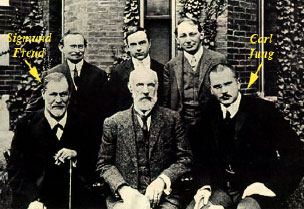







page 4 of 5
********
Humans at all times and places worldwide have wondered about life after the death of the body. Atheists such as Sigmund Freud considered this a reflection of childish wish fulfillment. How are we to judge Freud's view? Much of his psychiatric thinking has been discredited, abandoned even by his early followers. Freud's method involved analyzing his own neuroses and then projecting them onto the entire human race. Freud hated his religious Orthodox Jewish father, urinating in his father's bedroom at age seven. I think Freud is an unlikely candidate for representing all of humanity. The meaning of the word
 |
Psychologist Carl Jung towers over Freud in his understanding of the metaphysical aspects of human life. Jung introduced the concept of synchronicity, which he defined as "the meaningful coincidence of two or more events, where something other than the probability of chance is involved." This is the connection in time of related events that cannot be reasonably explained by random physical reality. Jung pioneered the study of psychological types: introversion and extraversion, thinking versus feeling, sensing versus intuiting. Jung explored universal human characteristics across time and culture, labeling this idea the collective unconscious. Jung stated that beyond each individual's personal consciousness, "there exists a second psychic system of a collective, universal, and impersonal nature" which consists of pre-existent forms, or archetypes.
The idea that the human being has a lasting soul is nearly universal. From

![]() Socrates, to Greek mythology, Norse mythology, Hinduism, Buddhism, Judaism, Islam and Christianity, the concept of a metaphysical soul residing in the physical body is ubiquitous. Socrates posited a cycle of reincarnation for immortal souls, subject to earthly virtues. Greek mythology fashioned Hades for its afterlife, while the Scandinavians awaited Valhalla. Hindus seek enlightenment after multiple lives, while Buddhists attain Nirvana. Jews anticipate resurrection or the Garden of Eden, while Muslims hope for the garden of Paradise. Christians look forward to eternal life in Heaven. If the soul continues to exist after the death of the physical body, then life on earth takes on a different significance. A person's finite existence on earth dwindles in importance compared to the eternal life of his soul. Any suffering, pain, or trauma experienced in bodily life diminishes to nothing measured against infinity. The worst earthly suffering becomes as insignificant as a child crying momentarily over a skinned knee.
Socrates, to Greek mythology, Norse mythology, Hinduism, Buddhism, Judaism, Islam and Christianity, the concept of a metaphysical soul residing in the physical body is ubiquitous. Socrates posited a cycle of reincarnation for immortal souls, subject to earthly virtues. Greek mythology fashioned Hades for its afterlife, while the Scandinavians awaited Valhalla. Hindus seek enlightenment after multiple lives, while Buddhists attain Nirvana. Jews anticipate resurrection or the Garden of Eden, while Muslims hope for the garden of Paradise. Christians look forward to eternal life in Heaven. If the soul continues to exist after the death of the physical body, then life on earth takes on a different significance. A person's finite existence on earth dwindles in importance compared to the eternal life of his soul. Any suffering, pain, or trauma experienced in bodily life diminishes to nothing measured against infinity. The worst earthly suffering becomes as insignificant as a child crying momentarily over a skinned knee.
If the Cappadocians are correct that life on earth is a school for rational souls, then we are being prepared by the Creator for the eternal afterlife.
| © Copyright 2006-2007 PDH |    |